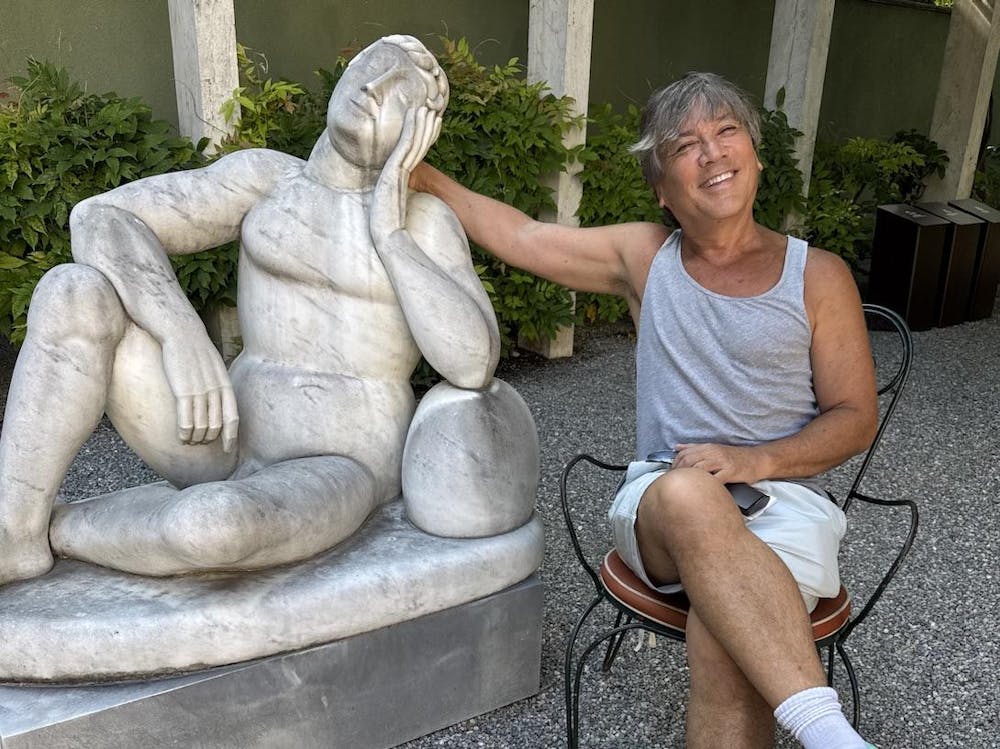I’m thirteen minutes into an interview with Professor Jeff Nunokawa when I realize he’s been interviewing me. He’s coaxed me towards an autobiographical ramble about my parents’ impending divorce, my inseparableness from my mother, and our unconventional Manhattan shoebox apartment.
At the time, a piece of me couldn’t fathom that I’d confessed so much to a stranger. Now that I know him, I know that this is how he is. He couldn’t resist trying to understand me.
Nunokawa has been teaching in Princeton’s English Department since 1988 and still remains a must-see attraction for Princetonians. But for all the theatrics of his pedagogical performance, he’s most arresting one-on-one.
We retreated to his office, snacking on cashews. Ideas and references and existential questions poured from Nunokawa as he reclined in his chair, legs crossed at the ankles on his desk, sprawling towards me when particularly moved by a thought.
The office itself is a similarly whirling inventory of life and mind: fortresses of books in every nook, shelf, and a shopping cart. Walls papered with postcards and photographs, clippings and maps.

The office.
Lola Horowitz / The Daily Princetonian
The typical Nunokawa lecture is an overload, too. It unfolds like this: Nunokawa stands center stage, clutching a page of “Jane Eyre” quotes, pronouncing an excerpt about the monotonous protagonist’s life with the vociferousness of a politician, “School rules and duties and habits and notions and voices and faces and phrases and costumes!” He never breaks for breath and, before long, is relating Victorian literature to a Zippy the Pinhead comic. “All life is a blur of Republicans and meat!”
Nunokawa’s signature for decades has been 19th Century Fiction, a course devoted to nineteenth-century novels from Jane Austen to George Eliot. Not a single student sitting in McCosh 28 can doze off or duck from sight when Nunokawa is a watchful whirlwind pacing the lecture stage. His enunciated speech punctuated by flailing gesticulations and passionate yells, occasionally interrupted by a childhood anecdote or a Paul Newman movie reference, render the Victorian themes relevant to the present day.

“I thought it was a character at first,” said Ev Wellmon ’28, having taken 19th Century Fiction in the fall of her freshman year. “Sure, it may be a character, but it is how he is in one-on-one interactions, and as a lecturer that’s just how he expresses himself.”
Nunokawa is as eccentric and unbound in the classroom as he is in his ENG345 emails, which read, “Emma!!!!!!!!!!!!!!!!!!!!!!!!!!!!!!!!!!!!!!!!!!!!!!!!!!!!!!!!!!!!!!!!!!!!!!!!!!!!!!!!!!!!!!!!!!!!!!!!!!!!!!!!!” Or, more probingly, “Introductory --how the nineteenth century novel haunts my dreams and yours.” Then, he signs off in an emphatic, “SEE YOU SOON KIDS! CAN'T WAIT!!!!!!!!!!!!!!!!!!!!!!!!!!!!!!!!!!!!!!!!!”
“I have never had a professor that made me want to be a professor before,” said Tyler Wilson ’26, currently enrolled in 19th Century Fiction and formerly enrolled in Nunokawa’s spring course, The Essay. “But to watch the way he goes about interacting with students and engaging with students. I'm like, damn, that could be me.”
The physicality and seeming spontaneity of Nunokawa’s teachings, all while holding a Red Bull and sweating through his attire, the Nunokawa that shows up to lecture, devoted to “Emma,” is the same Nunokawa who shows up to a one-on-one conversation, fascinated by the idiosyncrasies of the person before him.

Nunokawa isn’t married and doesn’t have kids, but “I have this huge surrogate family,” he tells me.
The connections he maintains with friends and former students are no less important to him than the nuclear American household.
“Friendships are like marriages. They’re like any family. They cannot be taken for granted. They have to be nourished. They have to be tended to, they have to be kept up.”
“I feel fully human when I’m talking to him,” said Professor Gage McWeeny GS ’03 of Williams College, a former student turned close friend and colleague of Nunokawa’s for over thirty years. Nunokawa had been his dissertation advisor upon being admitted into Princeton’s PhD program, and Professor McWeeny was even a preceptor for 19th Century Fiction. The two worked closely together, developing a relationship entangled in the personal and the intellectual. “I feel fully human, that I have to bring my full humanity to that conversation.”
How often does one get to feel fully human in a conversation, down to the marrow? It’s a demanding, frightening state, but not for Nunokawa. He is fully there, fully engaged, for one person and the next, for a thirty-year-long friend and a first-year undergraduate. His interlocutor gets all of him in a conversation and, almost instinctively, the interlocutor is compelled to bring all of themselves in return.
“When you’re talking with Jeff, it is the only thing that matters,” said Professor McWeeny over a phone call. “That comes not through any overt proselytizing by Jeff or something. It’s just the intensity of his engagement that then produces an intensity of engagement in you.”
What Nunokawa evokes in his students and seeds in them through his lectures is not often realized in the semester they’re enrolled in his course. He knows, realistically, that every student doesn’t diligently complete the assigned readings, but what he imparts about Victorian literature is not easily forgotten. Its brilliance can resound ten years post-grad, when a former student picks up Vanity Fair for a second reading and reaches out to Nunokawa expressing their amazement.
For others, the touch of Nunokawa’s commanded language, his crafted anecdotes and eccentricities, is felt immediately and overwhelmingly.
Clara McWeeny ’25, Professor McWeeny’s daughter, had Nunokawa as a figure in her life since she was born, but for a long while only perceived him in the abstract sense through her father’s stories. “When you're growing up, you have all these role models, and you don't really think of your parents as having role models. But I remember from a very young age, I was like, oh yeah, okay, Jeff is my dad’s role model,” she said.
In McWeeny’s junior spring, she enrolled in 19th Century Fiction and had Nunokawa as a lecturer and preceptor. McWeeny distinctly recalled the last lecture of the semester, on “Middlemarch.” “I sat in his lecture, and just openly wept and during his final lecture, and I was kind of embarrassed about it, and then I looked around, and everyone else was kind of weeping too,” she said. The finality of the class wasn’t what brought McWeeny to tears, she clarified, but rather the way Nunokawa taught. Like a gravitational pull, there’s an irresistible sense that one should lean in and listen a little closer when he’s speaking.
Even after graduation, Nunokawa’s moving conversations and knowledge still seep into Princetonians’ lives. Isabelle Clayton ’25 was one member in an intimate gathering of post-grad English majors held at Nunokawa’s New York apartment this past September, where they read aloud the ending of John Milton’s “Paradise Lost.” Clayton was struck by the collectivity of this moment. “He brought us back to our literary roots,” she said.
Professors often pass through students’ lives like trains in a station, but in the momentary time they dwell, an impression is made — and Nunokawa leaves a lasting one. He nurtures his friendships — his quasi-marriages — intellectually and emotionally, with provoking discussions and utter attention, imparting his raw perceptions and “equipment for living,” as Professor McWeeny called it.
Nunokawa isn’t a character. He’s the director. His performed lectures are entirely thought out. The notes scattered on his lecture podium are archeological, reaching as far back as 1982. Arguments he’s refined for several decades and continues to renovate as new thoughts occur, rendering his writings comprehensible to the new generation.
“It’s a lot like a sermon,” Nunokawa explained, not in the sense of preaching a doctrinal sermon, but rather a secular scripture entangled in and surpassing his own ego. “I’m not trying to compare myself to a priest or man of God, and I don’t believe what I’m doing is the ‘God’ term, but I take it really seriously.”
Nunokawa takes hours to prepare and renovate each lecture. On the days he teaches, he rarely schedules anything between the hours he rises at 7 a.m. until he’s mounted the McCosh 28 stage at 2:25 p.m. “I am very concerned that what I’m saying works, makes sense like what I’m saying actually is cogent, clear and resonant,” he explained.
All this conscientiousness surmounts to the ultimate moment when he bounds into the lecture hall and breathlessly gazes at the faces of his students, riddled with curiosity. Nunokawa still succumbs to the tendency of walking through his lecture hall and asking, “Was that clear? Was that clear?” Which, he prefaces, is just an indirect way of asking, “Do you love me? Do you love me?”
For Nunokawa, to be understood is to be loved, which may explain how he manages to maintain such long-lasting connections with his students. He delves beyond the superficial familiarity a professor is meant to have with their undergraduates. He needs to present himself fully so that he can truly be seen by others and, in turn, he is driven to see others.
“I want to be loved and also admired. I want to teach them something as well as have them like me,” he said. “It’s got to be both.”
Even as generations of students pass, as his notes pile, as his office brims with more books, he doesn’t believe 19th Century Fiction will ever near perfection, and that’s precisely what makes him an “exquisitely lucky man.” He will never stop reconsidering, rewriting, because as short as one Princeton semester is, as life is, Nunokawa’s art is long.
Ever the English professor, Nunokawa offered me a morsel of Chaucer to go with the cashews. “The lyf so short, the craft so long to lerne.”
Lola Horowitz is a contributing Features writer for the ‘Prince.’
Please send any corrections to corrections[at]dailyprincetonian.com.








